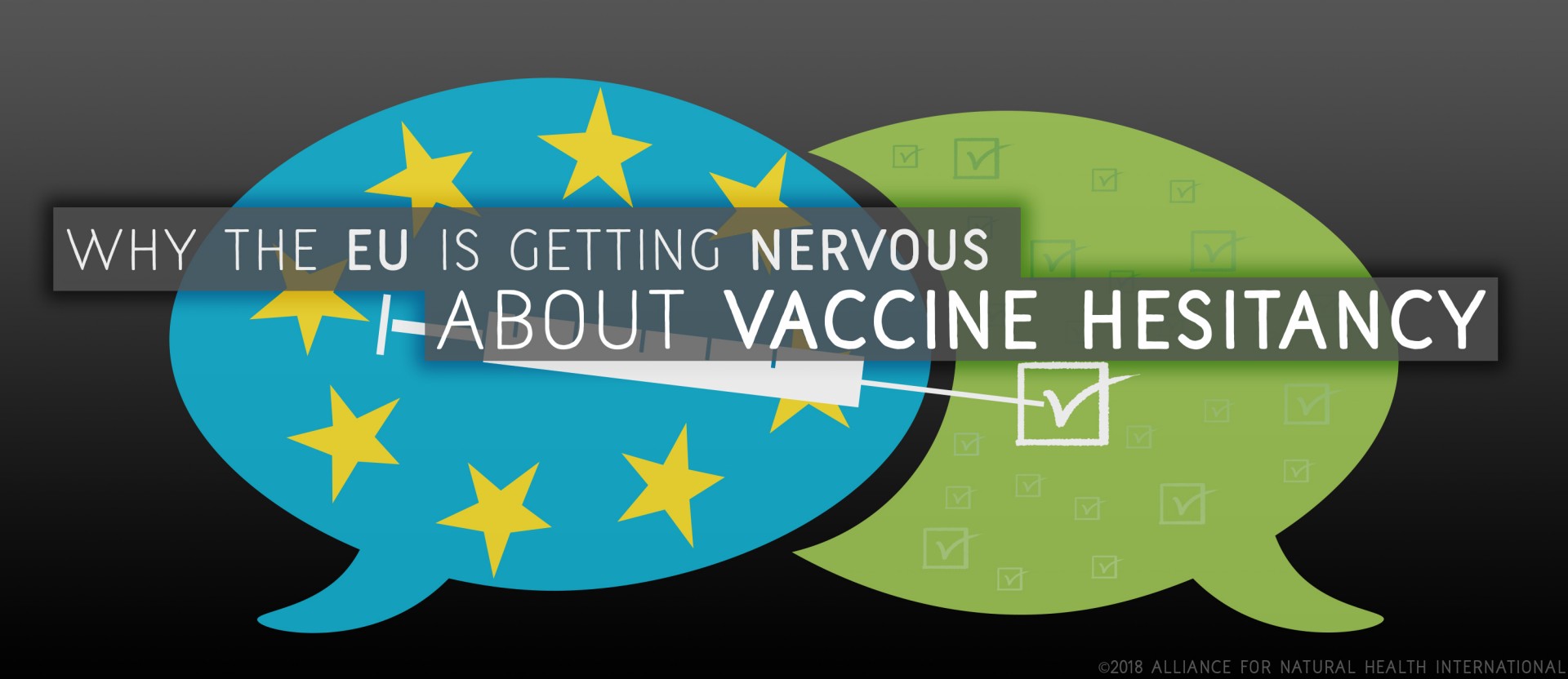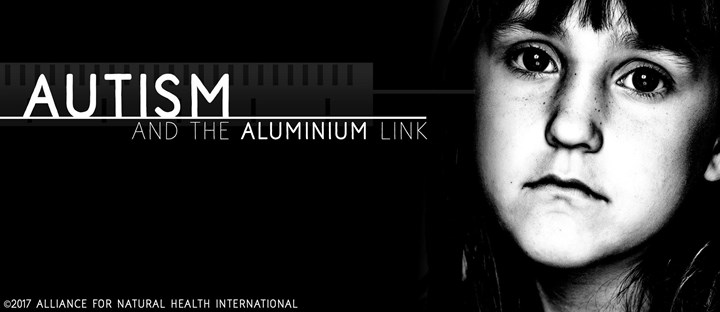Content Sections
With more and more EU countries mandating vaccination and beginning to impose punitive measures on those not wishing to take the risk (such as the No Jab No Play campaign in Australia), legitimate opposition grows. As concern about infringement of human rights and the potential for serious adverse events increases, the EU has launched an open public consultation, “Strengthened cooperation against vaccine preventable diseases”.
The deadline for public responses from EU citizens is midnight on 15 March, just 8 days from today. It's available in all EU languages. It will probably take you no more than 10 minutes to fill in - and you're welcome to look at our answers if it helps you (see the section below, headed 'ANH-Intl response'). The bad news is that the questionnaire is shockingly designed and heavily biased - but if you're concerned about mandatory vaccination, please don't let this be a reason to not fill it in.
ANH-Intl will be submitting its own response to what amounts to a very one-sided set of questions clearly designed to close down any further discussion around vaccination safety and efficacy. But all the same - let's at least use this as an opportunity to get some information across to EU officials responsible for public health.
Big Vax gets nervous about vaccine hesitancy
Patents are running out and the potential for new ‘blockbuster’ medications is becoming severely limited. Vaccines have increasingly become Big Pharma’s financial lifeline, but with more and more people worldwide questioning the necessity and safety of the increasing numbers of recommended vaccines, there is a potential looming threat to their once secure cash cow. With the largest dose sales of vaccines being given in developed, Western countries, it is no wonder why the EU's hackles would be up when more and more people are demonstrating concerns over the net impact of the vaccination schedule on their children.
Why you should respond to the EU vaccination consultation
We are extremely fortunate to live in a democratic society and as such the onus is on us to always hold the authorities to account, not be bullied and cowed into accepting what amounts to an attack on our rights and freedoms to choose. Any offered consultation gives us the opportunity to have our voices heard, but we certainly can’t complain if a lack of response or inability to question is ever used against us if we haven’t taken the opportunity to participate.
Why the consultation is a stitch-up for the pro-vax movement
Anyone steeped in the necessary, academic skills of unbiased questionnaire design will be shocked to see what's been cobbled together by the European Commission. It's full of leading questions, it fails to get any information about underlying concerns for vaccine hesitancy. Sadly – if unsurprisingly - the current consultation falls far short of most of the criteria required for good questionnaire design, this being especially problematic given the influence the European Commission has over national policies in the EU. It has clearly been designed to promote existing vaccination services with slight modification, leaving little room for any opposing views or suggestions contrary to the norm. In fact, the questions are so heavily skewed towards supporting increased levels of vaccination, the only opportunities to even broach the subject of scientific doubt lie in extremely restricted ‘open suggestion’ boxes. As we here at ANH-Intl know, however, when there's a will, there’s always a way!
ANH-Intl’s response
We’ve looked closely at the survey and formulated, what we consider, a useful response to the consultation for those concerned with vaccine choice and efficacy, which can be viewed or copied from, here.
Some of you may wish to go in even harder!
In our opinion the survey blatantly omits reference to:
Informed consent
The very authorities we rely on for accurate and unbiased information underestimate and denigrate the intelligence of the public by consistently referring to all vaccines as "safe" and "effective" when there is copious evidence that vaccines are often far from 100% effective (sometimes with very low or very limited evidence of effectiveness in some target populations e.g. flu vaccines in the elderly) and may result in significant and very serious side effects. Communication of information should be appropriately balanced and recognise vaccination as a medical intervention that has both risks and benefits. This should allow open and free discussion of concerns, known risks, identification of unknown risks and provision of additional information, including non-pharmaceutical options that can help protect against the relevant infectious disease(s) to allow citizens to make their own informed decision about vaccination without fear of the consequences or punishment
Sources of balanced, unbiased information about risks and benefits (of the vaccines and of the individual target pathogens/infectious diseases)
There are insufficient human studies that focus on non-target effects of vaccines, such as the impact on the gut microbiome, the neurological system and the long-term development of the immune system in children. Vaccine manufacturers are able to change vaccine formulations in ways that may significantly alter their risk/benefit profile, yet they are not required to submit comprehensive new safety and efficacy studies to regulators (e.g. the current deployment of Gardasil9 relies heavily on side effect data from the original Gardasil that targeted only HPV 16 and 18).
Balanced, unbiased education of healthcare professionals so that citizens, parents and guardians can make informed decisions
Healthcare professionals generally rely on scientific studies and information biased to the promotion of vaccination, from healthcare authorities when advising patients in regards to vaccination. There is a clear lack of high quality, relevant studies that evaluate overall health outcomes in vaccinated vs unvaccinated populations, and trials that compare the vaccine with placebo injections that are adjuvant-free, given mounting evidence for adverse effects associate with adjuvants (e.g. aluminium). No or insufficient relevant information is given to parents/guardians with children (including siblings) who are chemically hypersensitive and therefore may be at greater risk of suffering adverse reactions from vaccines. Information available from vaccine protagonists, such as Dr Paul Offit, is generally not credible in the eyes of those with reason to be hesitant about vaccines (e.g. parents who have already witnessed adverse reactions temporally linked to vaccination events in one or more other siblings). All healthcare professionals require access to unbiased information that includes the known benefits of specific vaccinations, known and unknown risks, non-pharmaceutical options that help prevent disease transmission and improve the immune response, and independent information resources on vaccination, including their known benefits and risks in order to properly inform patients. Only then will citizens be able to make informed decisions without coercion or fear.
The rights of vaccine-injured individuals
There are gross inadequacies in the legal rights of those who have suffered vaccine injury and their consequent compensation, either by vaccine manufacturers or Member States. It is wrong that liability for vaccine damage is passed back to the State and vaccine manufacturers avoid any culpability. There is understandable public mistrust of the licensing system for vaccines and other pharmaceuticals given extensive evidence of vested interests and revolving doors between regulatory authorities, manufacturers and health authorities such as the WHO and CDC.
What else you can do?
- Write to the European Commission to share your concerns regarding very poor and grossly inadequate questionnaire design used as the key information gathering step in the consultation
- Join the EFVV in writing to your MEP about your concerns
- Tell your friends and get them to participate in the survey
- Share this story to educate others and help them make informed choices about their healthcare
- Sign and share the ANH-Intl petition to Stop health authorities claiming that vaccines are ‘safe’
- Sign and share the EFVV petition calling on European authorities to Respect, promote and protect freedom of informed vaccination consent throughout Europe
Back to ANH International Homepage
Back to Vaccine Choice Campaign Page








Comments
your voice counts
08 March 2018 at 10:51 am
Mandates are totally against the Neuremberg Code ! Vaccines are not safe and many have been injured and killed by adverse reactions which are listed on the vaccine inserts! How dare you mandate anything against the consent of parents or persons. Personal liberty and freedom of choice should be a given right
08 March 2018 at 3:19 pm
Mandatory vaccines should not be implemented or forced onto any individual, as they are known to be unsafe for many & often not effective i.e flu vaccine & the elderly & very young, as well as Gardasil vaccine. With both these. vaccines outcomes have proved to be ineffective & or hugely damaging to a person's health, producing paralysis or even death. Where the risks are potentially so great, it is obvious that there needs to be choice, this should 'go without question'. Why should one life be worth less than another/others? There is no substance in this belief, no justification for this unethical & inequitable perspective. Human rights, according to the Nuremberg laws & freedom to make health choices, must be maintained & preserved for all of humanity!
08 March 2018 at 3:37 pm
I've experienced the real mumps and measles after having MMR so vaccine did not work. I also had many vacancies and the side effects were far worse than any so called vaccine preventable deseases. Get rid of all vaccines. Start promoting good health.
08 March 2018 at 10:56 pm
I completed the online 'consultation', it's nothing short of a propaganda exercise. There's almost nothing on risks or any possibility of validity of concern over vaccine. Quite scary.
09 March 2018 at 4:12 pm
Dear Carly thank you for showing your support for this very important issue.
With Kind regards
Miranda
09 March 2018 at 6:07 am
Когато има риск, трябва да има избор.
When there is a risk, there should be a choice.
Translation by google translate
09 March 2018 at 10:12 am
Hi, I just filled out the EU vaccine consultation as per yoru suggested answers and at the very end the long text that is supposed to be less than 1500 chars didn't fit, that is their form came back with a "this text is too long" and wouldn't let me proceed.
I checked, your text is indeed less than 1500, but I didn't want to spend all day removing characters one by one to see when it would let me pass so I deleted the last paragraph and put in a short message to the effect that I was getting an error message in error, and that it smelled of suppression of citizen's rights.
Perhaps it was just the fault of my computer somehow, but I hope it doesn't stop people from answering the last question as you suggest.
They need to fix this.
09 March 2018 at 4:28 pm
Hi Carole, as our article points out there is a lot of things wrong with this consultation, and your issues with the text boxes could well be deliberate we will never know.
With kind regards
Miranda
10 March 2018 at 9:59 am
On the last paragraph just take out the hyphens and it works move it all together then copy and paste and it takes it OK then. Sent!
12 March 2018 at 2:06 pm
Thank you Caroline for the update.
12 March 2018 at 11:46 am
Whatever your view on vaccines, they clearly should NOT be made compulsory. They are neither safe or effective, the 20th century mortality graphs bear this out. No lives were ever saved by vaccines. As a vegetarian I could never inject them. VACCINES ARE NOT VEGETARIAN. Far from it, they contain numerous animal ingredients derived from pig blood, horse blood, rabbit brains, dog kidneys, cow hearts, monkey kidneys, chick embryos, calf serum, sheep blood and more. If that's not anti-vegetarian enough, they also contain human DNA from aborted babies.
13 March 2018 at 2:23 pm
Why can’t people wake up! Who was the Brain dead person who thought is was such a grand idea to pump a ton of deadly chemicals into a small child n expect good health from that!😩wow! Do the research please ! Google Dr Tenpenny Dr Suzzane Humpries. Dr Wakefield great place to start ! We are the most vaxxed country anywhere (USA) n we have the sickest people why?? A combo of things Vaccines,perscription drugs GMOs in our foods n water ! We are so toxic that we are all sick a lot cancer is out of control ! Read the insert of a vaccine insert under side effects is cancer autism auto amune nallegies name it there’s a ton n in all of my research I’ve not found one good ingredient in any vaccines only chemicals!!😭
Your voice counts
We welcome your comments and are very interested in your point of view, but we ask that you keep them relevant to the article, that they be civil and without commercial links. All comments are moderated prior to being published. We reserve the right to edit or not publish comments that we consider abusive or offensive.
There is extra content here from a third party provider. You will be unable to see this content unless you agree to allow Content Cookies. Cookie Preferences